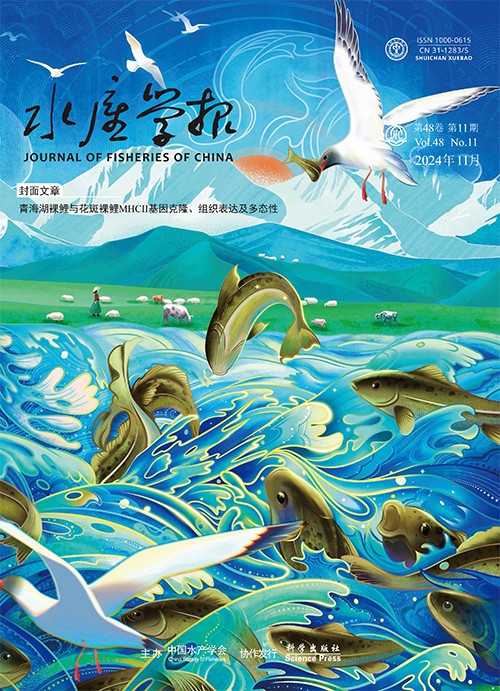The cross breeding and genetic analysis of hybrids of Larimichthys crocea(♀)and Nibea miichthioides(♂)
Q4 Environmental Science
引用次数: 3
Abstract
To understand the feasibility of cross breeding between Larimichthys crocea ♀ and Nibea miichthioides ♂,two hybrid families were built(LN1 and LN2).Ploidy of F1 hybrids was identified.Moreover,ten microsatellite loci were used for genetic relationship analysis between F1 hybrids and their parents.The result showed that L.crocea(♀)and N.miichthioides(♂)can be successfully crossed and hybrid offspring of normal survival were produced.Survival rate of hybrid offspring at the age of 45 days post hatch reached about 30%.However,fertilization rate(29.0%,32.6%)and hatching rate(75.0%,76.7%)of two hybrid families were significantly lower than those in large yellow croaker families(P0.05).Appearance of juvenile hybrid fish is visibly different from those of large yellow croaker,which has characteristics of both parents:slender body,sharp blunt head and their body sides are covered with black-brown spots.The results of DNA relative content investigation and genetic relationship analysis demonstrated that more than 90% of the hybrid offspring were hybrid diploid,in addition,a small number of those were hybrid triploid and gynogenesis diploid.Till the age of 45 days,growth rate of both hybrid diploid and hybrid triploid was slower than that of large yellow croaker.These findings will provide reference for exploitation and management of F1 hybrids of L.crocea(♀)and N.miichthioides(♂).大鲵(♀)与大鲵(♂)杂交选育及遗传分析
为了解Larimichthys crocea♀与Nibea miichthioides♂杂交育种的可行性,构建了两个杂交家族(LN1和LN2)。鉴定了F1杂种的倍性。此外,利用10个微卫星位点对F1杂交种与亲本的亲缘关系进行了分析。结果表明,大菱鲆(♀)与大菱鲆(♂)可以成功杂交,产生了正常存活的杂交后代。杂交后代在孵化后45天存活率可达30%左右。两个杂交科的受精率(29.0%、32.6%)和孵化率(75.0%、76.7%)显著低于大黄鱼科(P0.05)。杂交幼鱼的外貌与大黄鱼明显不同,大黄鱼具有双亲的特征:身体细长,头尖钝,身体两侧布满黑褐色斑点。DNA相对含量调查和亲缘关系分析结果表明,杂交后代90%以上为杂交二倍体,少数为杂交三倍体和雌性二倍体。到45日龄,杂交二倍体和杂交三倍体的生长速度都比大黄鱼慢。本研究结果可为大角田鼠(♀)和小角田鼠(♂)F1杂交品种的开发和管理提供参考。
本文章由计算机程序翻译,如有差异,请以英文原文为准。
求助全文
约1分钟内获得全文
求助全文
来源期刊

水产学报
Environmental Science-Management, Monitoring, Policy and Law
CiteScore
1.40
自引率
0.00%
发文量
5213
期刊介绍:
"Fisheries of" mainly reflects the results of scientific research and development of the direction of aquaculture for domestic and foreign academic exchanges Fisheries Service. Mainly basic research published in Fisheries, aquaculture and proliferation of fishing waters environmental protection, preservation of aquatic products processing and utilization, fishing equipment, and other aspects of mechanical papers, research briefings and reviewed.
 求助内容:
求助内容: 应助结果提醒方式:
应助结果提醒方式:


